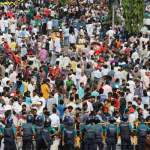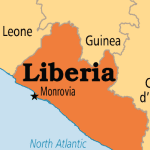Poland will hold legislative elections on October 15, that will influence how Warsaw interacts with the EU at a time when tensions along its eastern border are on the rise.
The president stated that whether there would be a thaw in relations with Brussels, which have been strained by disagreements over matters like the rule of law and migration, will likely depend on the outcome of the referendum in the bloc’s largest eastern member.
The election will also determine who will lead the NATO member and crucial Ukrainian ally at a period of rising insecurity on its eastern border, amid concerns of Wagner Group mercenaries in Belarus and an increase in illegal border crossings.
According to polls, the ruling nationalists Law and Justice, PIS, have maintained a slight advantage over the largest opposition party, the liberal Civic Platform PO, since 2015.
A cooperation with the far-right Confederation party is a possibility even if the winner of the 2015 and 2019 elections pulls off what would be an extraordinary third consecutive victory.
PIS’s campaign has so far revolved around an increase in payments under its signature Child Benefit policy, while emphasizing that it will take a tough stance on border security and criticizing PO’s subservient approach to relations with the EU and Germany.
It intends to hold a referendum on a European Union migrant pact, which Warsaw opposes, on the same day as the election.
PO claims that removing PIS from government is required to free EU subsidies that have been frozen owing to a dispute over the rule of law, as well as to reverse reforms to the court and state media that critics say have degraded democratic standards in the country.
Poland will hold legislative elections on October 15, that will influence how Warsaw interacts with the EU at a time when tensions along its eastern border are on the rise.
The president stated that whether there would be a thaw in relations with Brussels, which have been strained by disagreements over matters like the rule of law and migration, will likely depend on the outcome of the referendum in the bloc’s largest eastern member.
The election will also determine who will lead the NATO member and crucial Ukrainian ally at a period of rising insecurity on its eastern border, amid concerns of Wagner Group mercenaries in Belarus and an increase in illegal border crossings.
According to polls, the ruling nationalists Law and Justice, PIS, have maintained a slight advantage over the largest opposition party, the liberal Civic Platform PO, since 2015.
A cooperation with the far-right Confederation party is a possibility even if the winner of the 2015 and 2019 elections pulls off what would be an extraordinary third consecutive victory.
PIS’s campaign has so far revolved around an increase in payments under its signature Child Benefit policy, while emphasizing that it will take a tough stance on border security and criticizing PO’s subservient approach to relations with the EU and Germany.
It intends to hold a referendum on a European Union migrant pact, which Warsaw opposes, on the same day as the election.
PO claims that removing PIS from government is required to free EU subsidies that have been frozen owing to a dispute over the rule of law, as well as to reverse reforms to the court and state media that critics say have degraded democratic standards in the country.
Poland will hold legislative elections on October 15, that will influence how Warsaw interacts with the EU at a time when tensions along its eastern border are on the rise.
The president stated that whether there would be a thaw in relations with Brussels, which have been strained by disagreements over matters like the rule of law and migration, will likely depend on the outcome of the referendum in the bloc’s largest eastern member.
The election will also determine who will lead the NATO member and crucial Ukrainian ally at a period of rising insecurity on its eastern border, amid concerns of Wagner Group mercenaries in Belarus and an increase in illegal border crossings.
According to polls, the ruling nationalists Law and Justice, PIS, have maintained a slight advantage over the largest opposition party, the liberal Civic Platform PO, since 2015.
A cooperation with the far-right Confederation party is a possibility even if the winner of the 2015 and 2019 elections pulls off what would be an extraordinary third consecutive victory.
PIS’s campaign has so far revolved around an increase in payments under its signature Child Benefit policy, while emphasizing that it will take a tough stance on border security and criticizing PO’s subservient approach to relations with the EU and Germany.
It intends to hold a referendum on a European Union migrant pact, which Warsaw opposes, on the same day as the election.
PO claims that removing PIS from government is required to free EU subsidies that have been frozen owing to a dispute over the rule of law, as well as to reverse reforms to the court and state media that critics say have degraded democratic standards in the country.
Poland will hold legislative elections on October 15, that will influence how Warsaw interacts with the EU at a time when tensions along its eastern border are on the rise.
The president stated that whether there would be a thaw in relations with Brussels, which have been strained by disagreements over matters like the rule of law and migration, will likely depend on the outcome of the referendum in the bloc’s largest eastern member.
The election will also determine who will lead the NATO member and crucial Ukrainian ally at a period of rising insecurity on its eastern border, amid concerns of Wagner Group mercenaries in Belarus and an increase in illegal border crossings.
According to polls, the ruling nationalists Law and Justice, PIS, have maintained a slight advantage over the largest opposition party, the liberal Civic Platform PO, since 2015.
A cooperation with the far-right Confederation party is a possibility even if the winner of the 2015 and 2019 elections pulls off what would be an extraordinary third consecutive victory.
PIS’s campaign has so far revolved around an increase in payments under its signature Child Benefit policy, while emphasizing that it will take a tough stance on border security and criticizing PO’s subservient approach to relations with the EU and Germany.
It intends to hold a referendum on a European Union migrant pact, which Warsaw opposes, on the same day as the election.
PO claims that removing PIS from government is required to free EU subsidies that have been frozen owing to a dispute over the rule of law, as well as to reverse reforms to the court and state media that critics say have degraded democratic standards in the country.
Poland will hold legislative elections on October 15, that will influence how Warsaw interacts with the EU at a time when tensions along its eastern border are on the rise.
The president stated that whether there would be a thaw in relations with Brussels, which have been strained by disagreements over matters like the rule of law and migration, will likely depend on the outcome of the referendum in the bloc’s largest eastern member.
The election will also determine who will lead the NATO member and crucial Ukrainian ally at a period of rising insecurity on its eastern border, amid concerns of Wagner Group mercenaries in Belarus and an increase in illegal border crossings.
According to polls, the ruling nationalists Law and Justice, PIS, have maintained a slight advantage over the largest opposition party, the liberal Civic Platform PO, since 2015.
A cooperation with the far-right Confederation party is a possibility even if the winner of the 2015 and 2019 elections pulls off what would be an extraordinary third consecutive victory.
PIS’s campaign has so far revolved around an increase in payments under its signature Child Benefit policy, while emphasizing that it will take a tough stance on border security and criticizing PO’s subservient approach to relations with the EU and Germany.
It intends to hold a referendum on a European Union migrant pact, which Warsaw opposes, on the same day as the election.
PO claims that removing PIS from government is required to free EU subsidies that have been frozen owing to a dispute over the rule of law, as well as to reverse reforms to the court and state media that critics say have degraded democratic standards in the country.
Poland will hold legislative elections on October 15, that will influence how Warsaw interacts with the EU at a time when tensions along its eastern border are on the rise.
The president stated that whether there would be a thaw in relations with Brussels, which have been strained by disagreements over matters like the rule of law and migration, will likely depend on the outcome of the referendum in the bloc’s largest eastern member.
The election will also determine who will lead the NATO member and crucial Ukrainian ally at a period of rising insecurity on its eastern border, amid concerns of Wagner Group mercenaries in Belarus and an increase in illegal border crossings.
According to polls, the ruling nationalists Law and Justice, PIS, have maintained a slight advantage over the largest opposition party, the liberal Civic Platform PO, since 2015.
A cooperation with the far-right Confederation party is a possibility even if the winner of the 2015 and 2019 elections pulls off what would be an extraordinary third consecutive victory.
PIS’s campaign has so far revolved around an increase in payments under its signature Child Benefit policy, while emphasizing that it will take a tough stance on border security and criticizing PO’s subservient approach to relations with the EU and Germany.
It intends to hold a referendum on a European Union migrant pact, which Warsaw opposes, on the same day as the election.
PO claims that removing PIS from government is required to free EU subsidies that have been frozen owing to a dispute over the rule of law, as well as to reverse reforms to the court and state media that critics say have degraded democratic standards in the country.
Poland will hold legislative elections on October 15, that will influence how Warsaw interacts with the EU at a time when tensions along its eastern border are on the rise.
The president stated that whether there would be a thaw in relations with Brussels, which have been strained by disagreements over matters like the rule of law and migration, will likely depend on the outcome of the referendum in the bloc’s largest eastern member.
The election will also determine who will lead the NATO member and crucial Ukrainian ally at a period of rising insecurity on its eastern border, amid concerns of Wagner Group mercenaries in Belarus and an increase in illegal border crossings.
According to polls, the ruling nationalists Law and Justice, PIS, have maintained a slight advantage over the largest opposition party, the liberal Civic Platform PO, since 2015.
A cooperation with the far-right Confederation party is a possibility even if the winner of the 2015 and 2019 elections pulls off what would be an extraordinary third consecutive victory.
PIS’s campaign has so far revolved around an increase in payments under its signature Child Benefit policy, while emphasizing that it will take a tough stance on border security and criticizing PO’s subservient approach to relations with the EU and Germany.
It intends to hold a referendum on a European Union migrant pact, which Warsaw opposes, on the same day as the election.
PO claims that removing PIS from government is required to free EU subsidies that have been frozen owing to a dispute over the rule of law, as well as to reverse reforms to the court and state media that critics say have degraded democratic standards in the country.
Poland will hold legislative elections on October 15, that will influence how Warsaw interacts with the EU at a time when tensions along its eastern border are on the rise.
The president stated that whether there would be a thaw in relations with Brussels, which have been strained by disagreements over matters like the rule of law and migration, will likely depend on the outcome of the referendum in the bloc’s largest eastern member.
The election will also determine who will lead the NATO member and crucial Ukrainian ally at a period of rising insecurity on its eastern border, amid concerns of Wagner Group mercenaries in Belarus and an increase in illegal border crossings.
According to polls, the ruling nationalists Law and Justice, PIS, have maintained a slight advantage over the largest opposition party, the liberal Civic Platform PO, since 2015.
A cooperation with the far-right Confederation party is a possibility even if the winner of the 2015 and 2019 elections pulls off what would be an extraordinary third consecutive victory.
PIS’s campaign has so far revolved around an increase in payments under its signature Child Benefit policy, while emphasizing that it will take a tough stance on border security and criticizing PO’s subservient approach to relations with the EU and Germany.
It intends to hold a referendum on a European Union migrant pact, which Warsaw opposes, on the same day as the election.
PO claims that removing PIS from government is required to free EU subsidies that have been frozen owing to a dispute over the rule of law, as well as to reverse reforms to the court and state media that critics say have degraded democratic standards in the country.














